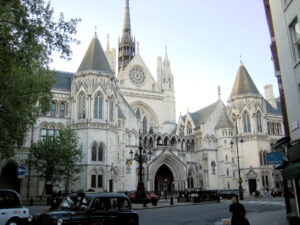Feature: The legal challenge to the government’s Net Zero Strategy
Stephen Cirell, an independent consultant on climate change, low carbon and renewable energy, explains the recent judgement on the Government’s Net Zero Strategy and the precedent this sets for the next Prime Minister.
Last week an important judgement was handed down in the High Court on climate change in the UK and the Government’s management of the process. Three separate cases had been brought by Friends of the Earth, Client Earth and The Good Law Project. Each had claimed in one way or another that the Government’s Net Zero Strategy was not in compliance with the law set down in the Climate Change Act 2008.
As has been widely reported, the applicants won in their request for Judicial Review. However, looking at the substantive elements of this important case what can be learnt about its implications for the future?
The case essentially turned on the interpretation of sections 13 and 14 of the Climate Change Act. In summary, s13 imposes a duty on the Secretary of State to prepare such proposals and policies as he considers will enable the carbon budgets in the Act to be met. Section 14 requires that as soon as reasonably practicable after setting a carbon budget, the Secretary of State must lay before Parliament a report setting out proposals and policies for meeting the current and future budgetary periods.
Following the setting of the Sixth Carbon Budget, the Secretary of State laid the Net Zero Strategy before Parliament on 19 October 2021 as a report under s14 of the 2008 Act. The claimants challenged the Secretary of State’s decision to approve the policies put forward in the Net Zero Strategy under s13 and the decision to publish the Strategy as a report under s14. There were essentially three grounds. The first ground was under s13 and revolved around the ability of the Secretary of State to decide the policies in the Strategy were sufficient to meet the carbon budget and/or his decision making process was flawed.
The second ground, under s14 of the Act, was that the Government failed to include in the Strategy information legally required to discharge the reporting obligations under the Act, namely how the policies would achieve the carbon budgets, with what individual contributions and over what timescales.
The third ground was under the Human Rights Act 1998.

In essence, the claimants succeeded (at least to some part) under both grounds 1 and 2 but failed under ground 3. This is likely to be a very important precedent, as barring an appeal (permission to appeal was refused), it will be a precedent for how the Government has to construe ss 13 and 14 of the Act moving forwards. For the purposes of this article, a number of key points can be highlighted.
The place to start is on a positive note. No one is challenging the Climate Change Act or its infrastructure. One could not conclude otherwise from the Judge’s detailed outline as to how the whole system of climate change law has been developed in the UK that it is a comprehensive and sophisticated system. The Act provides legal duties on the Government – the first in the world to do so.
As I have pointed out many times to local authorities, those duties fall squarely on the shoulders of the Secretary of State and central Government. This case proves that he or she has to exercise them carefully and in strict accordance with the Act. The notion of carbon budgets is a strong one, as is the Parliamentary approval process and the necessity for the Government to introduce policies to meet those targets. Again, the case shows that the development of policy has to be carefully manoeuvred to comply with the legislative provisions.
The piece de resistance of the Climate Change Act, however, is the provision setting up the Climate Change Committee as an independent adviser to the Government. Under the Act, the purpose of the Committee is to advise the UK and devolved governments on emissions targets and to report to Parliament on progress made in reducing greenhouse gas emissions and preparing for and adapting to the impacts of climate change.
The Climate Change Committee thus has a powerful role and acts with such authority and expertise that it is continually holding the Government’s feet to the fire. This was evidenced in the case, with the Judge referring to the fact the Committee had commented about the policy framework and the data provided in support. In the establishment of other organisations (such as the Office for Environmental Protection established under the Environment Act 2021) the ability to hold Government to account is much weaker.
The case also provides that there are people and organisations that are prepared to hold the Government to account in relation to climate change. Judicial review challenges are expensive and time consuming but play an important role in shaping the Government’s actions. Whilst there is a trend in more litigation of this nature, this is the first time that a substantive case has been brought on these important points.
But it is crucial to note what the nature of the challenge was. As indicated above, no one is challenging the Climate Change Act itself or its main provisions. The carbon budgetary process is working well and in the early stages of the budgets, the UK has managed to meet the targets, although this will get harder from here on.
Judicial review also cannot be used to challenge the Government’s policies themselves, as they are preserve of the sitting Government. Here, the Net Zero Strategy contains much good content (as confirmed by the Climate Change Committee), but it was the evidential support that was lacking. So the raft of policies brought forward by the Government are all positive, but under the legislation, the Government has to show how those policies both individually and collectively will meet the carbon budgets. So it was the very last part of the mechanism that was flawed.
It has to be pointed out that the applicants did not get their own way on all of the points. Nonetheless, the approach to the interpretation of ss 13 and 14 of the Act is a positive step forwards.
At the current time it is impossible to avoid the leadership contest for the Conservative Party. The winner, of course, becomes both the head of the party but also Prime Minister to fill the position vacated by Boris Johnson. Concern has been expressed in many quarters of the environmental lobby about negative comments made by participants in the race about climate change and the impact of the costs of the transition on the cost of living.
This would be a disastrous moment to slacken the pace towards net zero and so this case reminds us that the legislation is clear and the targets are set in law. Not only that, the case reinforces the point that the Government has to continually come up with a policy framework to demonstrate that those targets can be met. This effectively prevents any Government kicking climate change ‘into the long grass’. The new Prime Minister when appointed would do well to take notice of that fact.
Local authorities are not under any of the principal duties in the Climate Change Act. However, they are subject to legal duties across a range of their wider functions from waste management to air quality. This means that they are unlikely to avoid this new trend towards more litigation against public bodies in the performance of their statutory duties. Although not on the same point, the case reminds us that any public body has to discharge its functions in accordance with the law and act carefully at all times to ensure that it is doing so. This will undoubtedly have resource implications as the climate further deteriorates and the urgency to combat global warming rises still further.
On the national scene, it seems likely that there will be further cases over the next few years that will continue to provide judicial clarity on the proper interpretation of the provisions of the Climate Change Act 2008 and it does not look likely that the Government will be able to wriggle off the hook of its extensive obligations.
For now, the Secretary of State has to provide a compliant report under s14 within the next eight months and that will enable everyone to see in more detail how the policies will enable the carbon budgets to be met. If there is any doubt about their potential to do this, the Government will be forced to introduce new policy measures to meet any shortfall (there are plenty of suggestions, such as a national energy efficiency drive). If the scenario experienced on air quality is anything to go by (where the Government lost three Judicial Reviews on the trot by not providing sufficient measures to meet the clean air legislation) this could be a lengthy saga.
Photos by Tingey Injury Law Firm and American Public Power Association













